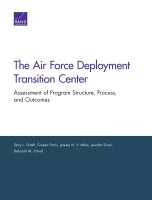| 来源类型 | Research Reports
|
| 规范类型 | 报告
|
| DOI | https://doi.org/10.7249/RR918
|
| ISBN | 9780833095404
|
| 来源ID | RR-918-OSD
|
| The Air Force Deployment Transition Center: Assessment of Program Structure, Process, and Outcomes |
| Terry L. Schell; Coreen Farris; Jeremy N. V. Miles; Jennifer Sloan; Deborah M. Scharf
|
| 发表日期 | 2016
|
| 出版年 | 2016
|
| 页码 | 98
|
| 语种 | 英语
|
| 结论 |
Scientific Literature Supports Some Deployment Transition Center (DTC) Practices, but Others Are Contraindicated- The DTC program consists of a rest and relaxation component, an after-action interview to provide feedback for leadership, a psychoeducational component on successful transitions from a deployment to home that is very similar to the Army's Battlemind program, and a component that is similar to several posttraumatic debriefing programs studied in civilian populations.
- The Army's Battlemind program has been shown to produce small reductions in posttraumatic stress disorder (PTSD) symptoms, depression symptoms, and sleep disturbance symptoms post-deployment among those with combat experiences; elements of the DTC program that borrow from Battlemind may be beneficial.
- Psychological debriefing programs — a primary prevention program involving groups of nondiagnosed individuals discussing and emotionally processing stressful incidents — have been well studied in a variety of populations and repeatedly been found to be either ineffective or harmful to participants. U.S. Department of Defense, U.S. Department of Veterans Affairs, and World Health Organization treatment guidelines for traumatized populations specifically recommend against these programs because of the lack of efficacy and potential for harm.
Most DTC Attendees Were Satisfied with the Program- Eighty percent of DTC participants believed the program was a worthwhile experience, and 74 percent believed they were better prepared for reintegration after completing the program.
DTC Did Not Improve Measured Post-Deployment Outcomes- A comparison of DTC attendees and a control group of airmen showed no evidence of significant reductions in PTSD symptoms, frequency of depression symptoms, binge drinking, or social conflicts attributable to DTC.
|
| 摘要 |
- If the main goals of the DTC program are improvements in psychological and social outcomes after reintegration, then the DTC program should be discontinued or redesigned, and resources directed to DTC should be invested in alternative programs or treatments that have been demonstrated to improve those outcomes.
- If the DTC has other goals and potential benefits, not assessed in this evaluation — such as providing airmen with well-deserved rest and relaxation following a difficult deployment, capturing after-action information that can feed into improved training and tasking, reducing stress during homecoming, or improving retention among airmen — then the program should be restructured around those alternative goals.
- Even if improving behavioral health is identified as a key program goal, remove the contraindicated program element of group processing of psychological trauma and develop policy to prevent its reintroduction.
|
| 主题 | Depression
; Military Health and Health Care
; Posttraumatic Stress Disorder
; United States Air Force
|
| URL | https://www.rand.org/pubs/research_reports/RR918.html
|
| 来源智库 | RAND Corporation (United States)
|
| 引用统计 |
|
| 资源类型 | 智库出版物
|
| 条目标识符 | http://119.78.100.153/handle/2XGU8XDN/108404
|
推荐引用方式
GB/T 7714 |
Terry L. Schell,Coreen Farris,Jeremy N. V. Miles,et al. The Air Force Deployment Transition Center: Assessment of Program Structure, Process, and Outcomes. 2016.
|
|
文件名:
|
x1519662677980.jpg
|
|
格式:
|
JPEG
|

|
文件名:
|
RAND_RR918.pdf
|
|
格式:
|
Adobe PDF
|
除非特别说明,本系统中所有内容都受版权保护,并保留所有权利。